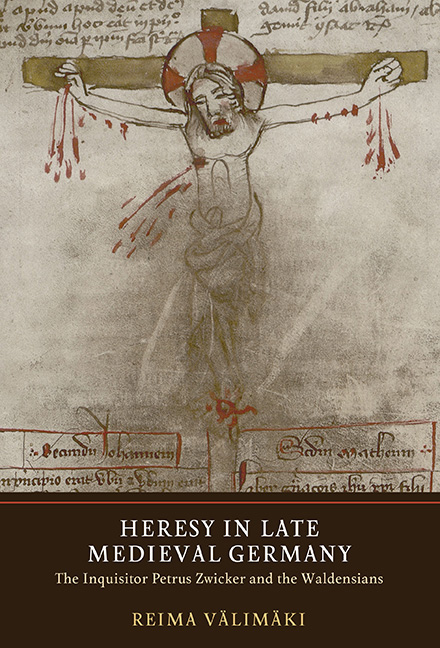Book contents
- Frontmatter
- Dedication
- Contents
- List of Illustrations
- Author's Note
- Acknowledgements
- List of Abbreviations
- Introduction
- 1 Petrus Zwicker and the Career of an Inquisitor at the Turn of the Fifteenth Century
- 2 The Inquisitor Writes
- 3 The Inquisitor's Practice and his Legacy
- 4 Communicating Faith
- 5 The Dissidents, the Clergy and the Church
- Epilogue: The Consolation of Inquisition
- Appendix 1 Manuscript Descriptions
- Appendix 2 Chapters and Titles of the Cum dormirent homines according to Jacob Gretser (1613/77)
- Appendix 3 The Circulation of the Processus Petri together with the Cum dormirent homines
- Appendix 4 Inquisitors' Manuals of St Florian and Linz
- Appendix 5 Collation of Formularies in St Florian, MS XI 234 and Würzburg, UB MS M. ch. f. 51
- Bibliography
- Index
- YORK MEDIEVAL PRESS: PUBLICATIONS
Appendix 1 - Manuscript Descriptions
Published online by Cambridge University Press: 26 March 2019
- Frontmatter
- Dedication
- Contents
- List of Illustrations
- Author's Note
- Acknowledgements
- List of Abbreviations
- Introduction
- 1 Petrus Zwicker and the Career of an Inquisitor at the Turn of the Fifteenth Century
- 2 The Inquisitor Writes
- 3 The Inquisitor's Practice and his Legacy
- 4 Communicating Faith
- 5 The Dissidents, the Clergy and the Church
- Epilogue: The Consolation of Inquisition
- Appendix 1 Manuscript Descriptions
- Appendix 2 Chapters and Titles of the Cum dormirent homines according to Jacob Gretser (1613/77)
- Appendix 3 The Circulation of the Processus Petri together with the Cum dormirent homines
- Appendix 4 Inquisitors' Manuals of St Florian and Linz
- Appendix 5 Collation of Formularies in St Florian, MS XI 234 and Würzburg, UB MS M. ch. f. 51
- Bibliography
- Index
- YORK MEDIEVAL PRESS: PUBLICATIONS
Summary
The purpose of the manuscript descriptions is to provide basic information on the transmission history of the analysed works of Petrus Zwicker: the Refutatio errorum; the Cum dormirent homines; the Processus Petri; and the two inquisitors’ manuals Zwicker used. The descriptions cover the parts relevant to these texts and provide references to the most up-to-date codicological descriptions of each manuscript. Appendix 1 is also meant to serve as an update to the listing of the Cum dormirent homines manuscripts published by Biller in 2001. Current shelfmarks are provided, and I have redated some manuscripts and described the contents in more detail. The manuscripts of the Refutatio errorum are comprehensively listed for the first time. Because the text has four different redactions, I have provided incipits and explicits for the Refutatio. Otherwise incipits and explicits are given only when it is necessary for the evaluation of the text version, for example in fragmentary copies.
Abbreviations: CDH = Cum dormirent homines; PP = Processus Petri. R1–4 = Refutatio errorum, redactions 1–4; Abbreviations of the Processus Petri according to Appendix 3 and the list in Chapter 3, pp. 109–11. The editions of the works of Petrus Zwicker have been presented in Chapters 1–3, and are not repeated here.
Manuscripts with the Refutatio errorum
Augsburg, Staats- und Stadtbibliothek (StaSB) MS 2o Cod 185 (215 × 150) Paper. 277 fols. C.1400–60s. Theological compilation, different, originally independent fascicules. The fascicule with R2 (fols. 227r–242v) belongs to the oldest material. It is written by one hand and forms a compilation on heresy.
Provenance: Augustinian Canons of the Holy Cross in Augsburg. Contents: (227r) Nomina mendicancium; (227v–228r) various short notices and excerpts (canon law; Pseudo-Augustine); (228r) Four sects of the heretics in Germany. Similar text printed in Schmidt, ‘Actenstucke’, pp. 245–7; (228r) Short notice on Mathew 26:52; (229r–238r) R2 [inc.] Nota quod erroribus hereticorum waldensium est istis et aliis scripturis obviandum […] [expl.] specialem ymmo spiritualem vtilitatem viderit expedire; (238v–242r) Proceedings against the Beghard Johannes de Bruna (Brno). Unpublished. See Lerner, The Heresy of the Free Spirit, pp. 108–12; (242r–v) Interrogatory of dominus Martini (Martinus of Amberg/Prague?) against Beghards.
- Type
- Chapter
- Information
- Heresy in Late Medieval GermanyThe Inquisitor Petrus Zwicker and the Waldensians, pp. 262 - 289Publisher: Boydell & BrewerPrint publication year: 2019



